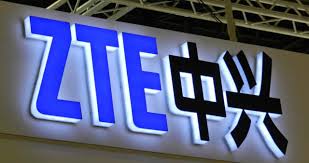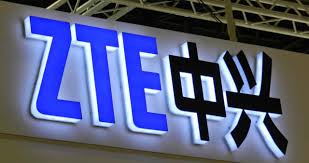
For violating U.S. laws that restrict the sale of American-made technology to Iran and North Korea, Chinese telecom equipment maker ZTE Corp has agreed to pay $892 million and plead guilty to criminal charges.
For a company that relies on U.S. suppliers for 25 percent to 30 percent of its components, the resolution could lift some uncertainty even as a guilty plea deals a blow to ZTE's reputation.
By buying U.S. components, incorporating them into ZTE equipment and illegally shipping them to Iran, ZTE conspired to evade U.S. embargoes, found a five-year investigation. Charges related to 283 shipments of telecommunications equipment to North Korea were also levelled against it additionally.
"ZTE Corporation not only violated export controls that keep sensitive American technology out of the hands of hostile regimes like Iran's, they lied ... about their illegal acts," U.S. Attorney General Jeff Sessions said in a statement.
In addition to obstruction of justice for an elaborate cover-up, and making a material false statement for claims it was complying with regulations, ZTE agreed to plead guilty to conspiring to violate the International Emergency Economic Powers Act.
There were reports in 2012 that ZTE had signed contracts to ship millions of dollars worth of hardware and software from some of the best-known U.S. technology companies to Iran's largest telecoms carrier and the investigation which was spearheaded by the U.S. Department of Commerce, followed such reports.
Since the Shenzhen-based company has a U.S. subsidiary in Richardson, Texas, its guilty pleas, which must be approved by a judge, will take place in U.S. District Court in Texas.
ZTE was included in a list of entities that U.S. firm could not supply without a license, in March 2016. The Commerce Department said at the time that ZTE acted contrary to U.S. national security or foreign policy interests.
Its results could be impacted by the penalties, ZTE warned last month. According to Thomson Reuters data, the market capitalization of the company is about 60 billion yuan ($8.7 billion).
With the latest reprieve expiring March 29, a temporary general license that was extended several times, has been used by the company to continue to do business with U.S. suppliers.
According to a company spokesma, every year about $2.6 billion worth of components is purchased by ZTE from U.S. technology companies. Among its suppliers are Qualcomm, Microsoft and Intel.
Routers, microprocessors and servers controlled under export regulations are among the items shipped in violation of U.S. export laws.
To prevent disclosure of the sales, executives at ZTE approved the scheme, authorities said. Materials involving ZTE's Iran business after March 2012 were destroyed or sanitized by a data team and this was part of the scheme.
"Despite ZTE's repeated attempts to thwart the investigation, the dogged determination of investigators uncovered damning evidence," said Douglas Hassebrock, director of the Commerce Department office that led the investigation.
With the potential to be activated if there are further violations, a seven-year suspended denial of export privileges was agreed to by the company. The receipt of U.S. origin goods and technology would be barred by a denial order.
Eric Hirschhorn, former Under Secretary at the Commerce Department, who was involved in the investigation, said that the denial order is key to keeping ZTE in line.
“If the suspension is removed, they’ll probably be put out of business,” he said.
(Source:www.reuters.com)
For a company that relies on U.S. suppliers for 25 percent to 30 percent of its components, the resolution could lift some uncertainty even as a guilty plea deals a blow to ZTE's reputation.
By buying U.S. components, incorporating them into ZTE equipment and illegally shipping them to Iran, ZTE conspired to evade U.S. embargoes, found a five-year investigation. Charges related to 283 shipments of telecommunications equipment to North Korea were also levelled against it additionally.
"ZTE Corporation not only violated export controls that keep sensitive American technology out of the hands of hostile regimes like Iran's, they lied ... about their illegal acts," U.S. Attorney General Jeff Sessions said in a statement.
In addition to obstruction of justice for an elaborate cover-up, and making a material false statement for claims it was complying with regulations, ZTE agreed to plead guilty to conspiring to violate the International Emergency Economic Powers Act.
There were reports in 2012 that ZTE had signed contracts to ship millions of dollars worth of hardware and software from some of the best-known U.S. technology companies to Iran's largest telecoms carrier and the investigation which was spearheaded by the U.S. Department of Commerce, followed such reports.
Since the Shenzhen-based company has a U.S. subsidiary in Richardson, Texas, its guilty pleas, which must be approved by a judge, will take place in U.S. District Court in Texas.
ZTE was included in a list of entities that U.S. firm could not supply without a license, in March 2016. The Commerce Department said at the time that ZTE acted contrary to U.S. national security or foreign policy interests.
Its results could be impacted by the penalties, ZTE warned last month. According to Thomson Reuters data, the market capitalization of the company is about 60 billion yuan ($8.7 billion).
With the latest reprieve expiring March 29, a temporary general license that was extended several times, has been used by the company to continue to do business with U.S. suppliers.
According to a company spokesma, every year about $2.6 billion worth of components is purchased by ZTE from U.S. technology companies. Among its suppliers are Qualcomm, Microsoft and Intel.
Routers, microprocessors and servers controlled under export regulations are among the items shipped in violation of U.S. export laws.
To prevent disclosure of the sales, executives at ZTE approved the scheme, authorities said. Materials involving ZTE's Iran business after March 2012 were destroyed or sanitized by a data team and this was part of the scheme.
"Despite ZTE's repeated attempts to thwart the investigation, the dogged determination of investigators uncovered damning evidence," said Douglas Hassebrock, director of the Commerce Department office that led the investigation.
With the potential to be activated if there are further violations, a seven-year suspended denial of export privileges was agreed to by the company. The receipt of U.S. origin goods and technology would be barred by a denial order.
Eric Hirschhorn, former Under Secretary at the Commerce Department, who was involved in the investigation, said that the denial order is key to keeping ZTE in line.
“If the suspension is removed, they’ll probably be put out of business,” he said.
(Source:www.reuters.com)














